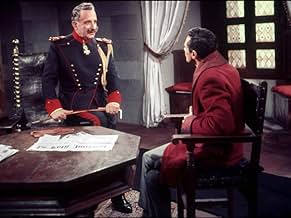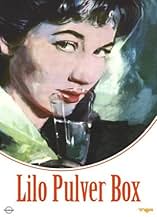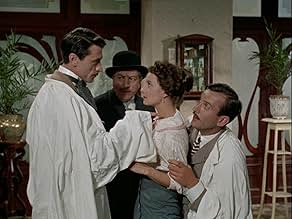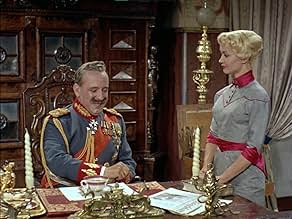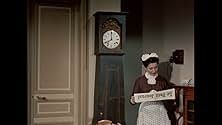अपनी भाषा में प्लॉट जोड़ेंArsène Lupin, the gentleman thief with a hundred disguises, has just pulled off two burglaries in Paris when he is kidnapped. The ravishing Mina von Kraft, a German, has masterminded the dee... सभी पढ़ेंArsène Lupin, the gentleman thief with a hundred disguises, has just pulled off two burglaries in Paris when he is kidnapped. The ravishing Mina von Kraft, a German, has masterminded the deed for Emperor Wilhelm II.Arsène Lupin, the gentleman thief with a hundred disguises, has just pulled off two burglaries in Paris when he is kidnapped. The ravishing Mina von Kraft, a German, has masterminded the deed for Emperor Wilhelm II.
- निर्देशक
- लेखक
- स्टार
- पुरस्कार
- 2 कुल नामांकन
- Le grand-père
- (as Mihalesco)
फ़ीचर्ड समीक्षाएं
Ravishingly produced in Technicolor, it is never more ravishing than when foregrounding the radiant smile of Liselotte Pulver, whose character forever seems on the verge of amounting to more than she ever actually does. Both she and Huguette Hue look most fetching in their figure-hugging ankle length Edwardian dresses; but their scenes lead nowhere, and the film becomes garrulous and uninvolving. Is it just coincidence that this was Becker's only film without his regular editor Marguerite Renoir?
This is the image of Lupin that has seeped into popular culture, and innumerated by Maurice LeBlanc in his many volumes, easily foiling the brightest of not so bright police minds, including the legendary detective Holmlock Shears. But there is another Lupin far from this cosy image, detailed in LeBlanc's first book 'Arsene Lupin, Gentleman Thief' (1896). This book has fair claim as the pioneer of French crime cinema as it was to develop, distinct from its American counterpart.
This Lupin was a deeply ambiguous figure, not existing fully in the text as a character, but an ungraspable presence flitting in and out. Through a series of unstable narratives, Lupin never emerged whole, as if his very identity was destroyed by the need to don an array of disguises. But if this figure is personally marginalised, his very insubstantiality is more threatening to society, as you are never quite sure who he is, where he's going to strike next. This makes everyone, including the law, a suspect, and undermines the confidence of a society. The American crime cinema has usually been about the whole individual, buffeted by circumstances or his own tragically flawed personality. French crime films undermine the very idea of the individual and society.
This is obviously much easier to do in literature than in a film, especially a straightforward narrative film. While a literary character can hide in the text with the collusion of the narrator, a film character is always present, no matter what disguise he wears. Filmed, Lupin is suddenly deprived of his omniscient power, further trapped by Becker's famously contained style, in which nothing seems to exist outside of the frame.
So the film becomes less about the adventures of Lupin than a critique. His corporeality is foregrounded. For instance in the books, crimes are committed as if by magic, later explained; here we watch every detail as they happen, everything is mundane and plausible. But Becker's mise-en-scene offers the opposite. Strange from a director with a greeater claim to poetic realism than a Carne, AVENTURES is a candy-coloured confection of the purest artifice - this is not the teeming Paris of Zola, it even avoids the sumptuous elegance of a Visconti - this is a Faberge world of mansions, balls, castles on craggy mountain tops, expensive jewellery shops, AVENGERS-like inventions. But the sets make no attempt to make these realistic on this level, being rather theatrical and flimsy. Even the more familiar street scenes seem artifical, almost abstract and dreamlike, with a few stylised extras doing nothing to create atmosphere.
This air of unreality is perfect for games, and near the start we see Lupin taking off a disguise like an actor taking off his make up (which he keeps in a safe; normal bourgeois are defined by their wealth which confirms their identity, he by undermining identity), But behind the jokey, elaborate, rather obvious petty crimes, which certainly hurt no-one (and, unlike the books, there is a complete minimising of the police here; the one potential threat is a friend who unwittingly bails him out), there is a melancholy more typical of Becker.
Lupin is so in command of his personae that he has no identity of his own - he must even put on an act in his own home. This prohibits any kind of relationship with women, and it is when he seems to fall for one that he is at his most vulnerable. So Lupin becomes almost a tragic hero, a monastic gamesplayer who is forever cut off from the joys of life, with no past to speak of, a puppet, court jester ( the chessboard floor of the ball gives this away), playing games to amuse the wealthy, scuttling like a spinning top in a never-ending present; like Max in TOUCHEZ PAS AU GRISBI, he is a prisoner of his own identity. Arsene Lupin is in hell.
Maurice Leblanc's afficionados will be disappointed:this is an original screenplay,borrowing some elements from the short stories of "Arsène Lupin gentleman cambrioleur" (the lighter aspect of the writer)and incorporating some of "813" (but without the suspense and the diabolic atmosphere of this very long novel in which Lupin is completely defeated).But it's finally unambitious and uninteresting.It avoids the strong anti-German feel which we can find in the books though.Time had passed.
Robert Lamoureux is not Arsène Lupin at all;Edouard Molinaro will cast Jean-Claude Brialy as the famous hero with better results in his "Arsène Lupin contre Arsène Lupin" (1962),but nothing extraordinary.
We are still waiting for the director who will do Maurice Leblanc justice.
क्या आपको पता है
- ट्रिवियाFinnish censorship visa # 049306.
- गूफ़सभी एंट्री में स्पॉइलर हैं
- भाव
Kaiser Wilhelm II: Vous voyez monsieur, je m'éclaire encore au pétrole. Moi je déteste l'électricité.
André Larouche: Vous avez raison, sir, c'est un éclairage barbare. Mais qui ne sera malheureusement pas abandonné de si tôt.
- कनेक्शनReferenced in To vlemma tou Odyssea (1995)
टॉप पसंद
विवरण
- रिलीज़ की तारीख़
- कंट्री ऑफ़ ओरिजिन
- आधिकारिक साइट
- भाषाएं
- इस रूप में भी जाना जाता है
- The Adventures of Arsène Lupin
- फ़िल्माने की जगहें
- उत्पादन कंपनियां
- IMDbPro पर और कंपनी क्रेडिट देखें
इस पेज में योगदान दें


![Bande-annonce [OV] देखें](https://m.media-amazon.com/images/M/MV5BZjUzNWUxNGYtMmE0Yy00OTMyLWE4ZTMtYmM2MTQyYzhlOWExXkEyXkFqcGdeQW1haXdlbm4@._V1_QL75_UX500_CR0)

